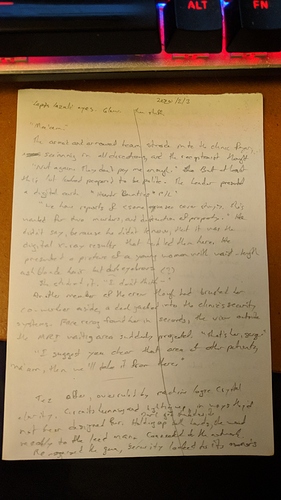Sorry for all the typos and even the wrong word (it should have been pane) I was writing near supper time and must have been really hungry! Also my tablet keyboard has a mind of its own sometimes 
In an altered form, it very well could be a “pain” of glass.
Speech recognition software is what I use to get my ideas, and books, on the page as well as any computer use generally. In this way, I don’t let my physical disabilities get in the way of my creation.
Got done transcribing one of my handwritten outlines a little bit ago and realized… this chapter introduces my characters into what might be considered “Extreme Hide and Seek.” They’re onboard a locked-down ship, and there’s a murderer hiding somewhere onboard. O_O
Hand written in longhand? Give me a break. My penmanship is so bad that even I can’t read it. Back in the dark ages when I got my start as a writer, I carried the obligatory pocket notebooks but my note taking was a slow, laborious process because I had to print everything if I wanted to read my notes. When small cassette recorders became available, it was a day to celebrate. Today I carry a digital voice recorder. Today I often dictate my text into my Notebook or Laptop using voice to text programs. Anyway, I have written nothing in longhand since graduating from high school and then college back in the 1960s.
I do both. Mostly I type straight into the wordprocessor, but if I need to “think aloud” I prefer to do that by writing it down on paper. I also prefer paper when I’m doing an especially difficult scene, partly because it feels more organic somehow but more I think because there are fewer distractions. I also find it helpful at those times to be lying on my sofa, so I write on A6 sheets (A5 folded into little 4-page booklets) I bulldog clip to an A6 piece of cardboard. That way it feels very disposable and throw-away while still being permanent. When I get around to typing them up I cross out the sections or pages so I know I’ve captured as much of it as I want.
I write fast, but print for clarity, and writing small helps a lot since the pencil doesn’t move far. I even found 0.3mm propelling pencils and 0.3mm 2B pencil leads so the letters are crisp and I don’t need to worry about stopping to sharpen a pencil.
The above image is one such A6 page. I’m a bit short-sighted so I have no trouble reading it - usually!
I guess I write 80% on computer, about 20% on paper, and occasionally dictate short emails or notes to myself if I don’t have either of those handy.
Mostly typing although I will turn to handwriting if I need a change of pace. Also, certain types of revising I will do on printouts of the work rather than on a computer as it helps me see the text differently. What is 100% handwritten are my notes. Writing things down has always been my most successful way of learning things, so now I keep a ‘bible’ of everything story related: character histories, development, floor plans, maps, research notes, outlines, histories, music etc. in a specific journal-like notebook. It’s organized with an index that grows as the notes do and is beginning to tell its own story about how my current project is coming to be.
Handwriting? Oh… noooooooo. While my writing would look fine for a few paragraphs, it would quickly change to something unreadable. Plus, my hand would ache.
Writing in Word, with it set up as an actual 6x9 book works for me.
I used to only write longhand- with a sharp pencil and soft eraser. But my hand had trouble keeping up with my brain! The main reason… I write on the go- in the doctors waiting room, on the plane or train, on the beach (my favorite place!) on lunch break. Now I have small laptop so it travels with me.
And I no longer worry about that soft eraser wearing away!
As a recently retired ‘multi media marketing creative’, typing still feels too much like I am at work, so I have been using longhand for my newest novel attempt adventure.
So far so good, although I do worry about when the time comes to type it all up!
For fiction, I prefer typing. I never get far handwriting fiction. When I’m writing poetry, however, I prefer handwriting the first draft.
I hand write 1st drafts. 2nd draft usually starts with transcribing my 1st draft into my computer, changing and inserting as I go. After that I 3rd draft it and show parts to my critique group. Their advice, if I choose to accept it, is included in the 3rd.
I have done blog posts and short stories exclusively with a keyboard (though many of my short stories start as handwritten).
I almost always type when writing fiction. I find good ideas tend to come to me as my fingers dance over the keyboard. I find handwriting too slow, and too hard to revise. However, I’ve read that handwriting improves creativity because you’re actually creating the letters as you type.

